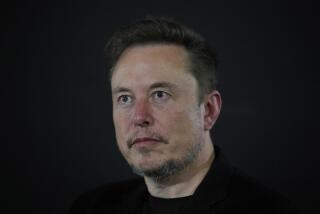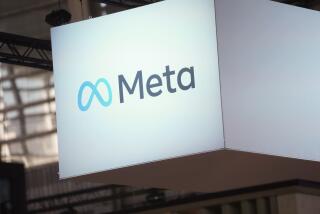Facebook to crack down on hate speech
SAN FRANCISCO — Activists say an online campaign to curb misogynist content on Facebook could be a watershed moment for a growing movement to remove posts and images that promote violence against women on the Web.
Women, Action and the Media launched the campaign last week, urging major companies to pull their advertisements from Facebook that could run alongside graphic language and images of rape, abuse and other violence against women.
Heeding the call, more than a dozen advertisers, including Nissan Motor Co. and Nationwide Building Society, removed their ads from Facebook, while others, such as American Express and Unilever’s Dove brand, pressured Facebook Inc. to remove the offending pages.
“This was a targeted, strategic and ultimately apparently quite effective campaign to try to force a powerful company to do more than it has been doing. That is something we haven’t seen much of yet,” said Susan Benesch, founder and director of the Dangerous Speech Project, who teaches human rights at American University.
Facebook, which makes the bulk of its revenue from advertising, said Tuesday that it is reviewing its guidelines to evaluate content that violates its standards and will train moderators to identify and remove hate speech.
“We need to do better — and we will,” Facebook said in a blog.
No one was more surprised by the international response to the campaign than the organizers. More than 5,000 people sent emails to Facebook advertisers. The campaign also generated more than 60,000 posts on Twitter using the hashtag #FBrape.
“This campaign is helping consumers who are users of these platforms understand that they don’t have to put up with this,” said Jaclyn Friedman, executive director of Women, Action and the Media. “Something can be done.”
The storm of controversy reveals the challenges that confront companies like Facebook, Google Inc. and Twitter Inc., which have had to become arbiters of free speech. Each company has to abide by the laws of every country in which it operates, but otherwise sets its own rules, weighing what kind of expression to allow and each day monitoring to see if anyone is breaking the rules.
But with a growing sense that digital media has become polluted by hate and violence that can be frightening and even dangerous for women, Benesch said companies are “increasingly thinking about and working on these issues.”
Activists say they purposefully targeted Facebook, which has spent considerable time and effort formulating a policy on hate speech. Other social media companies such as Twitter do not explicitly address hate speech.
“Facebook is an industry leader. This is about them owning the responsibility that comes with that,” Friedman said.
It’s a balancing act for Facebook, analysts say. If it censors content too much, it risks angering users. If it does not censor enough, it risks offending them and chasing off advertisers.
Yahoo Inc., which is buying blogging service Tumblr for $1 billion, said last week that it would continue the site’s policy of permitting explicit adult content. Twitter has a similar policy.
Facebook explicitly bans “hate speech,” but enforcing the ban has been a challenge. On social media, content is created by users and is constantly changing. On Facebook alone, 4.75 billion pieces of content are shared each day.
Facebook asks users to report content they find objectionable. Several hundred moderators then review that content and make a decision on a case-by-case basis. Facebook also has computer algorithms to pick out certain images and posts that may violate Facebook’s guidelines. But it can be highly subjective to decide which speech to ban.
Facebook, which bans nudity, found itself in a heated controversy over breast-feeding women with “nurse-ins” organized at the firm’s offices. Facebook also came under fire for removing a New Yorker illustration of Adam and Eve for showing bare breasts. It ultimately reversed the decision.
The company has taken steps to curb hate speech by no longer allowing pages with offensive content to operate anonymously. Facebook has begun forcing administrators of those pages to identify themselves or have the content removed.
“We’re not allowing those pages to be anonymous anymore,” Sheryl Sandberg, Facebook’s chief operating officer, said Wednesday. “We’re seeing a huge percentage of those pages coming down.”
Facebook advertisers are particularly sensitive to sexist or misogynist content. The majority of consumers of social media are women, and those are the consumers that brands such as Dove are trying to reach.
Dove did not pull its advertising from Facebook but said it has been “actively working” with the company to “address the issue of gender-based hate speech.”
“We welcome Facebook’s commitment to take additional measures to tackle the problem,” said Stacie Bright, global director of communications at Dove. “Dove takes this issue very seriously and does not condone any activity that intentionally insults any audience.”
Nissan pulled its ads, spokesman David Reuter said. “When we first learned that advertisements could follow Facebook users onto pages with offensive content, we acted quickly to freeze any rotations while we discussed the situation with Facebook,” he said.
Analysts say the online campaign to crack down on hate speech against women could prompt more interest groups to target social media the way they have targeted television networks and other traditional media in the past by pressuring advertisers.
That signals the growing importance and influence of social media, said Rebecca Lieb, an analyst with Altimeter Group. “A special interest group knows it can amplify its message and its agenda by loudly targeting something big,” Lieb said.
Times staff writer Dawn Chmielewski contributed to this report.






